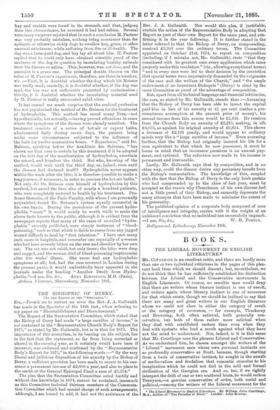THE BISHOPRIC OF DERRY.
[TO THE EDITOR OF THE " SPECTATOR."
SIR,—Permit me to correct an error the Rev. J. A. Galbraith has made in the Spectator of the 14th inst., when referring to my paper on " Disestablishment and Disendowment."
The Report of the Sustentation Committee, which stated that the Bishop of Derry had made "a large sacrifice of income," is not contained in the " Representative Church Body's Report for 1875," as stated by Mr. Galbraith, but is in that for 1874. The importance of this correction, in its bearing on the subject, lies in the fact that the statement, so far from being corrected or altered in the ensuing year, as it certainly would have been if incorrect, was endorsed and confirmed by the " Representative Body's Report for 1875," in the following words :—" By the very liberal and judicious disposition of his annuity by the Bishop of Derry, a sufficient provision has been made to secure to his suc- cessor a permanent income of £2,000 a year, and also to place to the credit of the General Episcopal Fund a sum of £5,354."
The plea that the Sustentation Committee acted hastily and without due knowledge in 1874, cannot be sustained, inasmuch as this Committee included thirteen members of the Commuta- tion Committee which had special charge of such arrangements, although, I am bound to add, it had not the assistance of the Rev. J. A. Galbraith. Nor would this plea, if justifiable, explain the action of the Representative Body in adopting that Report as part of their own Report for the same year, and con- firming it in the year following. It is further stated in the letter referred to that the Bishop of Derry, on compounding, received £5,300 over the ordinary terms. The Committee appointed on October' 21st, 1874, to report on composition (including, if I mistake not, Mr. Galbraith), state "that they considered with he greatest care every application which came properly under this resolution" (viz., allowing exceptional terms) " and in every case were led to their decision by the conviction that special terms were imperatively demanded by the exigencies of the case and the welfare of the Church," and " the ample endowment of an important Bishopric " (Derry) is cited by the same Committee as proof of the advantage of composition.
But, apart from all technical language and financial intricacies, the case, as stated by Mr. Galbraith, stands thus :—Assuming that the Bishop of Derry has been able to invest the capital paid him in lieu of his annuity at 4; per cent. (rather a pre- sumptuous assumption at the present price of money), his annual income from this source would be £2,448. He receives• from the Church Body an annuity of £2,215, making, in alb £4,663, as against his original annuity of £6,854. This shows a decrease of £2,191 yearly, and would appear to ordinary minds very like a " large sacrifice of income." Even assuming further, that the Bishop had originally insured his life for a sum equivalent to that which he now possesses, it must be- borne in mind that an insurance premium is an annual pay- ment, and optional. The reduction now made in his income is permanent and irrevocable.
Lastly, Mr. Galbraith says that by composition, and in no- other way, could the diocese derive any pecuniary benefit from the Bishop's commutation. The knowledge of this, coupled with the fact that the Bishop of Derry is the only Irish prelate who had compounded up to the close of last year, must be accepted as the reason why Churchmen of his own diocese feel not a little proud of their Bishop, and earnestly deprecate the- many attempts that have been made to minimise the extent of his generosity.
The published opinion of a corporate body composed of men of intelligence and integrity, carries with it the weight of an unbiassed conviction that no individual can successfully impeach.
—I am, Sir, &e., W. H. PORTER. Ballymacool, Letterkenny, November 19th.


































 Previous page
Previous page